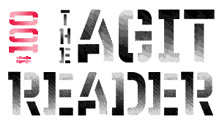
Warm Slime
In the Red
Given the proficiency with which John Dwyer’s Thee Oh Sees have spit out their variations on the psyche-garage cocktail, one would think that the band’s bent would start getting a bit redundant. If anything, as Warm Slime (their third album in just over a year) proves, the Bay Area rockers are becoming more adventurously woolly with each release.
That much is obvious from the leadoff title track, 13 minutes of an oily groove that winds up only to unspool luxuriously in several directions. Thee Oh Sees reveal themselves to be in group-think mode, as loose as can be, but completely in synch with another in the way only a band that’s spent more time playing than not can be. That the rest of the record isn’t simply an addendum further testifies to the continuous refinement of Thee Oh Sees’ squall. “I Was Denied” is a jumpy browbeater, while “Flash Bats” works the other end of the spectrum, plummeting headfirst into a blackened vortex of guitar. It may be hard work keeping up with these kids, but it’s well worth the effort.
Stephen Slaybaugh
MP3: “I Was Denied”

Gemini
Captured Tracks
It seems like only yesterday we were singing the praises of the Pains of Being Pure at Heart, enjoying their glimmer of nostalgia through a mild summer. And just like that, they’ve evaporated from the public’s consciousness. That’s the trouble with nostalgia acts that get their kicks from other bands that got their kicks from other bands—really all one needs is the recently released Black Tambourine reissue and you’ll never need to hear another female-led Brooklyn band for quite some time. Don’t let Jack Tatum fool you: Wild Nothing’s entrance music, “Summer Holiday,” is a carbon-copy of the kind of nostalgia-soaked jangle-pop that the Pains rejuvenated and wore to a finite yawn. But that’s where it stops for Tatum. While “Summer Holiday” is a brilliant stroke of pop awareness, sensitive to the whims of an audience that is still clamoring for trebly guitar clatter of this ilk, his search for a nostalgic sound goes much deeper.
Granted, the influence of the Cocteau Twins has become a welcomed congruence, but Tatum’s peers could never match the proximity with which “Drifter” presses those buttons. Full of Treasure’s crystalline fragility and ethereal distance, Gemini manages to be tangled in that same gossamer time-warp, yet focused on making pop songs yearning for accessibility. There are many moments on this record that resemble those fleeting remembrances of mall exploration, soundtracks to ’80s teen drama, the gay disco poolside—that’s when nostalgia is most effective. What accompanies those flashbacks for most of us, until you eventually fall down the rabbit hole and become infatuated with Z-list new wavers and new romantics, are dreamy Cure clusters or the streamlined gleam of a New Order bassline. With Tatum’s foppish playing and barely registering gasps, he’s deigned Gemini to be a perfect mimicry of those rushes of recollection. What separates Wild Nothing is authenticity. On “Bored Games,” Tatum’s not reserved enough to abate the neon lights of Erasure. while on “Chinatown” he’s channeling the cheekier sides of ABC and OMD. “Confirmation” reverts back to fluff-inflated one-hit wonders like General Public and Aztec Camera (the latter completely lost on American audiences). Almost to a fault, Tatum’s exploration into pristine synth-pop is so familiar it stings with nostalgia, but thankfully he displays the ingenuity needed to give Gemini the feeling that this is something overlooked 25 years ago, something you need in your collection, right next to your Level 42 and Yaz records. It’s nothing short of a delight.
Kevin J. Elliott
MP3: “Chinatown”

The Chaos
Dovecote
It’s never a good sign when the most interesting song on an album is a minute-and-a-half secret track. But it seems that somebody forgot to tell the Futureheads that there’s this new, state-of-the-art technology called iTunes that kind of defeats the purpose of such ’90s relics. Sadly, this sense of being stuck in the past is in keeping with the band’s modus operandi over their past two albums. Ever since their classic debut and their flawed, but enjoyable, sophomore release, News and Tributes, the British quartet have been running in place, unable to shake off the ’90s-punk tropes that always informed, though never dominated, their music. So while their latest, The Chaos, would make for a really good Offspring or Green Day album, it makes for a pretty lousy Futureheads album.
Of course, one thing the Futureheads will probably never lose is their ability to punch out anthemic choruses, of which The Chaos has more than a couple. On the title track, Barry Hyde sings, “Oh! The chaos! It’s everywhere, but what’s it got to do with us?!” over a chugging, hectic guitar riff. And “Struck Dumb” is a battering ram of a pop song that promotes the importance of positive thinking with the kind of starry eyed, yet authentic, optimism that Jimmy Eat World managed at their best.
When the Futureheads mix it up musically, like on the erratic “This Is the Life,” they start to approach the unhinged exuberance of their debut album. But when Hyde tries something new lyrically, the results range from awkward to disastrous. On “Sun Goes Down,” Hyde fancies himself punk rock’s answer to the National, but his indictment of nocturnal naughtiness lacks the specificity and intelligence of Matt Berninger’s fly-by-night anthems.
The Futureheads’ albums continue to sell remarkably well in their native UK, so I doubt that they’ll be skipping any meals in the wake of The Chaos. It’d be a shame if those nice sales margins were the reason the band no longer sounds like the hungry, manic punk rockers they once were.
David Holmes
MP3: “Struck Dumb”

Saint Bartlett
Secretly Canandian
Damien Jurado’s managed to deliver another set of songs so bleak that all you need is a set of headphones to to turn any party or coffee shop into a lonely getaway. Check out this lyric from “Rachel & Cali”: “Rachel, would it be okay if I stayed here in the car? There’s too many people out there I don’t know.” The distance in that line is exactly what sets Jurado apart from less determined songwriters, those who visit isolation like a holiday, writing a couple of acoustic tunes worth of sad-sack lyrics before setting them to a laptop beat.
But Jurado sticks with his agenda for album after album, as different as they all might be, sometimes releasing them so quickly it’s hard to digest one before the next arrives. Personally, I’m still enchanted by Caught in the Trees, so the timeless jalopy sound of Saint Barlett seems to me like a sign that Jurado might just now be hitting his stride. Producer Richard Swift tosses all of Jurado’s old tricks (some broken metal sounds, a pretty good Neil Young impression) and some new ones (some breaking piano sounds, a pretty good Thunderclap Newman impression) into the trunk and hobble from “Arkansas” to “Kansas City,” evoking along the way both Jurado’s heartbroken Pacific Northwest home and the vast, tragic landscape of middle-America’s musical heritage.
Sometimes, as on the opener “Cloudy Skies,” the extra touches make the song less about the writing and more about the impression it’s trying to make, and those moments don’t play to the songsmith’s strengths. Frequently, though, they let him do the one thing that Damien Jurado does better than anyone else. They mic him up close and personal to let him sing some slow, aching melodies right into your ear. He sings about storms and treasures and his lost companions, and the only accompaniment is a few notes on the guitar and an occasional swell of harmony. And that’s all he needs to remind you of just how good and how doleful his work can be.
Matt Slaybaugh
MP3: “Arkansas”

The Bride Screamed Murder
Ipecac
Time has a funny way of marching on. It’s almost inconceivable that the Melvins, arguable forefathers of both the grunge- and stoner-rock movements, have been tossing the sludge around for more than 25 years. When a band has been around for this long, it’s fairly easy to take them for granted. Old dog, you don’t know any new tricks! So it was quite a shock when the boys went through a rebirth of sorts during their 2004 collaboration with Jello Biafra, Never Breathe What You Can See. Gone were the “Sumo wrestler walking on a treadmill in a tar pit” tempos. The band sounded more spry, sharp and amped up than they had in years. Too bad the world wasn’t paying attention.
But while you were sleeping, after an almost comical revolving door of players, King Buzzo (vocal/guitars) and Dave Crover (drums) recruited Coady Willis (drums) and Jared Warren (bass/vocals), a.k.a. Big Business, to join the band in 2006. And that line-up is back for the latest Melvins record, The Bride Screamed Murder.
For those who only know the Melvins as purveyors of dark grooves, this version may seem unrecognizable. While in the past the band seemed to take a lot of delight in being the slowest, heaviest sound around, The Bride Screamed Murder has more than its share of up-tempo tracks. You could even dance to some of them! While they once could have been accused of just making variations of “Black Sabbath,” here it sounds like they’ve explored more songs from the FM Gold cannon. They even cover the Who’s “My Generation” (sans stuttering).
But what remains omnipresent is the band’s overlooked sense of humor. The opening cut, “The Water Glass,” breaks into a military-style call and response that’s both goofy and awesomely catchy. Then there’s the transitional pieces where they throw in everything from found sounds to ’50s-style crooning. Then they go full-tilt confusing with the closer “PG X3,” an odd collage of mournful harmonica, Irish lamenting, feedback solo and manipulated voices. For those who tuned out the Melvins during the past millennium, The Bride Screamed Murder is the perfect way to get reacquainted.
Dorian S. Ham

Say It
Warp
It’s only been a handful of years since Toronto’s Born Ruffians emerged with their self-titled EP, a fanciful record that included the infectious, irreverent assault on ennui, “This Sentence Will Ruin/Save Your Life,” and its fitful to-do list, which included getting “laid immediately.” On that song, in particular, they sounded like the heir apparent to Talking Heads, but that promise has subsequently failed to manifest into anything but a false first impression. While their full-length debut, Red Yellow & Blue, was a passable elaboration on the quirky pop with which they first dabbled, their second record, Say It is a milquetoast revision that plays out like some bad approximation of Vampire Weekend’s MO. And that’s a shame, because the world certainly doesn’t need anymore bands looking to fill Haircut 100’s shoes.
That’s when the band has the gumption to work up a sweat (“Retard Canard,” “The Ballad of Moose Bruce”). Most times (“Sole Brother,” “Come Back”), they can’t be bothered, instead sticking to a loping pace that only serves to accentuate the band’s most pedestrian qualities. It’s still possible to hear the band they could be here, but that possibility has probably already passed.
Stephen Slaybaugh
MP3: “Sole Brother”
ALBUM REVIEWS
Jamie Lidell, Compass
Andy Bell, Non-Stop
First Aid Kit, Drunken Trees EP
Hoodoo Gurus, Purity of Essence
The National, High Violet
Band of Horses, Infinite Arms
Audio Bullys, Higher Than the Eiffel
Japandroids, No Singles
Woven Bones, In and Out and Back Again
Solex vs. Cristina Martinez + Jon Spencer, Amsterdam Throwdown, King Street Showdown!
The Dead Weather, Sea of Cowards
Male Bonding, Nothing Hurts
Zs, New Slaves
Gun Outfit, Possession of Sound
